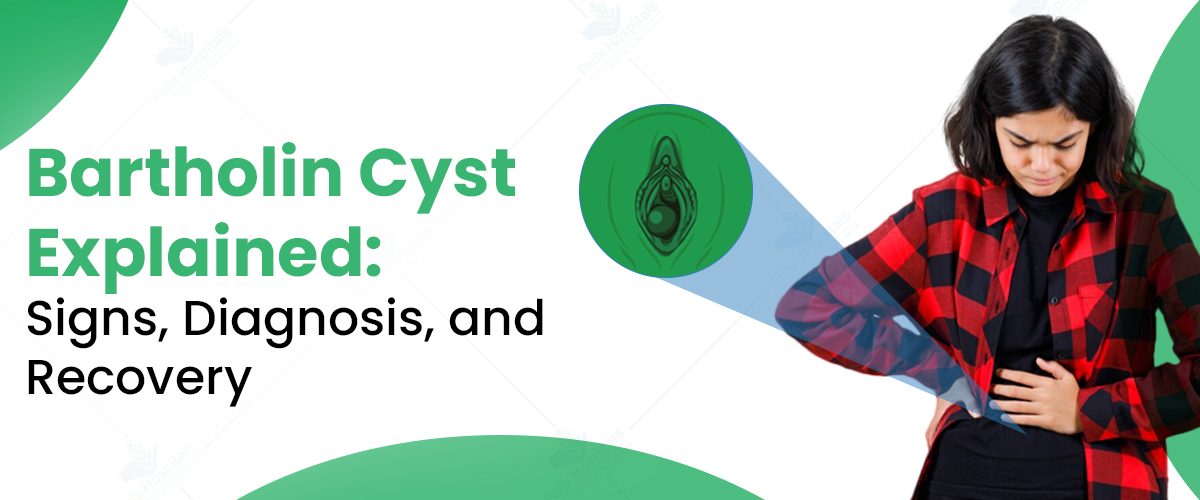
Subscribe to our

A Bartholin cyst is a condition that affects many women but is often overlooked or misunderstood. It occurs when one of the Bartholin glands, located on either side of the vaginal opening, becomes blocked, leading to a cyst. Though it can be uncomfortable, it’s important to know the signs, understand how it is diagnosed, and learn about the available treatments. At the best gynecologist hospital in Noida, expert care and accurate diagnosis are crucial in managing this condition effectively. In this blog, we’ll explore the key details about Bartholin cysts, including their signs, causes, diagnosis, treatment, and recovery options, as well as the expertise available to help you through the process.
Book an appointment with a top gynecologist by Clicking Here to get a proper diagnosis and personalized treatment plan!
A Bartholin cyst is a fluid-filled sac that forms when the Bartholin gland, located on either side of the vaginal opening, becomes blocked. The Bartholin glands are responsible for producing fluid that helps lubricate the vagina. When the duct that carries this fluid becomes obstructed, the fluid builds up inside the gland, causing a cyst to form.
These cysts can vary in size, ranging from tiny, non-painful cysts that may not require treatment, to larger, more painful cysts that can cause discomfort and require medical intervention. In some cases, a Bartholin cyst can become infected, leading to a painful abscess that may require surgical drainage.
The symptoms of a Bartholin cyst can vary depending on the size of the cyst and whether it becomes infected. In many cases, women may not experience any noticeable symptoms, especially if the cyst is small. However, when symptoms do occur, they may include:
If you notice any of these symptoms, it's important to seek medical attention promptly to avoid complications.
Bartholin cysts occur when the duct of the Bartholin gland becomes blocked, leading to fluid buildup. While the exact cause of the blockage is not always clear, several factors can contribute to the formation of a Bartholin cyst:
While these are some of the common causes, it is important to remember that Bartholin cysts can occur for no apparent reason in some women.
The diagnosis of a Bartholin cyst is typically straightforward and can often be made during a pelvic examination by a qualified gynecologist. The doctor will visually inspect the vaginal area and may gently palpate the affected area to feel the cyst.
In some cases, additional tests may be necessary to rule out other conditions or to assess if the cyst is infected. These may include:
It’s essential to visit a gynecologist to ensure an accurate diagnosis, as other conditions like tumors or abscesses may present with similar symptoms.
The treatment for a Bartholin cyst depends on the size of the cyst, whether it’s infected, and how much discomfort it’s causing. Here are some of the most common treatment options:
Recovery from Bartholin cyst treatment depends on the type of treatment administered. For minor cases, recovery may take just a few days, with little to no downtime required. For surgical treatments, the recovery period may be slightly longer:
It is important to follow your doctor’s instructions carefully to avoid complications during recovery and to reduce the risk of recurrence.
If you're looking for expert care for Bartholin cysts, it's essential to consult with experienced gynecologists who can guide you through the diagnosis and treatment process. At the best hospital for gynecology issues in Noida, the Felix Hospital we have a team of top-rated gynecologists specializing in women’s health:
If you are experiencing symptoms or suspect you have a Bartholin cyst, don’t hesitate to contact us at +91 9667064100.
Bartholin cysts are common but manageable conditions that, when treated promptly, often lead to full recovery. By understanding the signs, seeking timely diagnosis, and exploring the right treatment options, you can minimize discomfort and ensure your reproductive health is well cared for. At Felix Hospital, the best hospital in Noida, you can receive personalized and effective treatment for Bartholin cysts, ensuring optimal outcomes for your health.
1. What is the most common cause of a Bartholin cyst?
Ans: The most common cause is the blockage of the Bartholin gland duct, often due to infection or injury.
2. Can a Bartholin cyst be prevented?
Ans: While it cannot always be prevented, maintaining good hygiene and avoiding irritants may reduce the risk.
3. Is Bartholin cyst treatment painful?
Ans: Most treatments, including warm compresses and drainage, are minimally painful. Surgical interventions may require a longer recovery period.
4. How long does it take to recover from Bartholin cyst surgery?
Ans: Recovery times vary, but most women can expect to return to normal activities within a few days to a week after drainage or marsupialization.
5. Can a Bartholin cyst come back after treatment?
Ans: Yes, Bartholin cysts can recur. Marsupialization is a procedure often used to reduce the chances of recurrence.
6. Are Bartholin cysts dangerous?
Ans: While Bartholin cysts are not typically dangerous, they can cause discomfort and lead to infection if left untreated.
7. Can Bartholin cysts affect fertility?
Ans: Bartholin cysts typically do not affect fertility, but they may cause discomfort during intercourse or pelvic exams.
8. What happens if a Bartholin cyst is left untreated?
Ans: If left untreated, a Bartholin cyst may become infected and form an abscess, leading to more severe pain and potential complications.
9. What are the risks of Bartholin cyst surgery?
Ans: Risks are minimal but can include infection, scarring, or recurrence. Your doctor will discuss the potential risks with you before any surgical procedure.